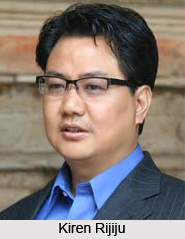 Kiren Rijiju is a prominent leader of Bharatiya Janata Party (BJP), now serving as a Minister of State for Home Affairs in India.
Kiren Rijiju is a prominent leader of Bharatiya Janata Party (BJP), now serving as a Minister of State for Home Affairs in India.
Kiren Rijiju is considered as the most respected face of Bharatiya Janata Party in the North East Indian states like Assam, Meghalaya, Manipur, Arunachal Pradesh, Mizoram and Nagaland. Through out India, Bharatiya Janata Party got a massive victory in Indian General Elections 2014. After that Kiren Rijiju was sworn as the Minister of State for Home Affairs in the Cabinet Ministry headed by Narendra Modi.
Early Life of Kiren Rijiju
Kiren Rijiju was born on 19th November 1971 in the region of Nafra, located in West Kameng district of Arunachal Pradesh. He did his graduation from Hansraj College, University of Delhi and also did another graduation from Campus Law Centre, under University of Delhi.
After completing his studies, Kiren Rijiju entered into the regional politics of north eastern states. There he joined with Bharatiya Janata Party. In the Indian general election, 2004, Kiren Rijiju became a member of the 14th Lok Sabha. He is representing the constituency of Arunachal West in the Indian Parliament. He was one of the most outspoken Parliamentarians in 14th Lok Sabha.
Political Career of Kiren Rijiju
Kiren Rijiju is most prominent in regional hemisphere of Bharatiya Janata Party. He was the National Secretary of Bharatiya Janata Party. In 2009 Indian general elections, he suffered defeat by narrow margin of 1314 votes against Takam Sanjoy, the candidate of Indian National Congress.
In 2014, he was elected again as a Member of Parliament (MP) in the 16th Lok Sabha elections, representing the Arunachal West constituency. Kiren Rijiju defeated Takam Sanjoy of the Indian National Congress by a margin of 41,738 votes. He considered himself to be a prominent nationalist in ideology. Kiren Rijiju is the most popular leader ever in Arunachal Pradesh and he is often being referred to as the voice of North East India. The 42 years old Kiren Rijiju is a good listener and a good orator. He in the previous Lok Sabha accepted every challenge made by the opponents.
Kiren Rijiju expresses his opinion and political ideology in writing articles in magazines, newspapers and periodicals. He occasionally writes articles pertaining to security also socio-economic issues.
Personal Life of Kiren Rijiju
Kiren Rijiju married Joram Rina Rijiju in 2004. She is presently an Assistant Professor teaching History at Dera Natung Government College, Itanagar (Arunachal Pradesh).




















